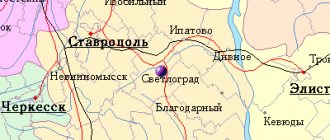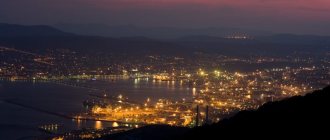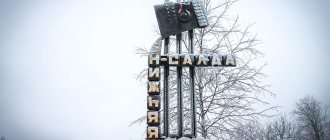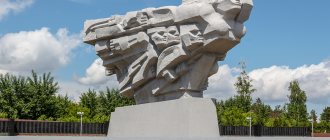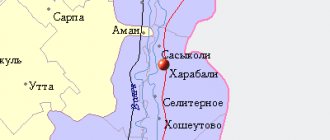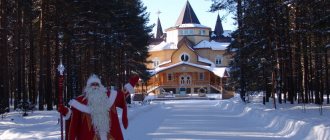| A country | Russia |
| Subject of the federation | Ryazan Oblast |
| Municipal district | Klepikovsky district |
| Postcode | 391001 |
| Timezone | UTC+4 |
| Coordinates | Coordinates: 55°06′43″ N. w. 40°33′58″ E. d. / 55.111944° s. w. 40.566111° E. d. (G) (O) (I)55°06′43″ n. w. 40°33′58″ E. d. / 55.111944° s. w. 40.566111° E. d. (G) (O) (I) |
| Confessional composition | majority are Orthodox |
| OKATO code | 61 210 554 |
| Former names | Nikolaevskaya Tuma |
| PGT with | 1938 |
| National composition | the majority are Russian |
| Population | ▲ 6,350[2] people (2010) |
| Vehicle code | 62 |
| Chapter | Lazarev Viktor Mikhailovich[1] |
Tuma is an urban-type settlement in the Klepikovsky district of the Ryazan region of Russia.
Population 6357 people (2008).
The village is located on the Narma River (a tributary of the Gus River), in the central part of the Meshcherskaya Lowland on a slight elevation - the Yegoryevsko-Kasimovskaya moraine ridge. The distance from the regional center is 30 km, from Ryazan - 96 km, from Moscow - 200 km.
Railway station: wide-gauge (Tuma - Vladimir) and narrow-gauge (Tuma - Golovanova Dacha) distances.
Story
The status of an urban-type settlement was received in 1938; before that time it was a village. The original name was Nikolaevskaya Tuma, the first component of which is associated with the local church: the settlement is mentioned in the scribe books of 1637-1648. like a graveyard with churches in the name of St. Nicholas the Wonderworker and Elijah the Prophet. The name Nikolaevskaya Tuma was opposed to the name Voskresenskaya Tuma, which was borne by the neighboring village (the village of Voskresenye). After 1917, in order to avoid associations with the name of Emperor Nicholas II, the village began to be called Tuma.
At the beginning of 1930, an anti-collective farm protest of peasants took place here. The reason was the closure of the rural Trinity Church by the district authorities. On the night of February 23, 150 people demanded that it be opened, and the next day there were already 500 of them. The same demands were made in another 5 neighboring villages, and in 4 villages the slogans “Down with collective farms!” were heard. As the security officers noted, the elements leading the movement tried to give it a political character by raising the slogan “Down with the Communists!” The movement covered Tuma, Tverino, Izvekovo, Vetchany and Spirino. In the latter, on February 28, an attempt was made on the life of the deputy secretary of the Tumsky district committee of the All-Union Communist Party (Bolsheviks) Brusilov - he was shot with a revolver.
Population
| Population | ||||||
| 1959[4] | 1970[5] | 1979[6] | 1989[7] | 2002[8] | 2009[9] | 2010[10] |
| 6937 | ↗7396 | ↘7211 | ↘7082 | ↘6596 | ↘6340 | ↘6163 |
| 2012[11] | 2013[12] | 2014[13] | 2015[14] | 2016[2] | ||
| ↘6153 | ↘6113 | ↘6036 | ↘5961 | ↘5915 | ||
Economy
In the village there is a Tumsk motor transport enterprise and a Ryazan timber industry enterprise, an asphalt concrete plant, and a clothing factory. The food industry is represented by a dairy plant and farms. In the vicinity of the village there is a gas compressor station "Tuma".
The trade sector is represented by chain supermarkets (“Magnit”, “Pyaterochka”, “Dixie”, “Avakado”, “Red and White”). Once a week, on Thursdays, there is a clothing and agricultural market in Tuma.
There are branches of the Russian Post and Sberbank in the village, and there is a weather station.
In Tuma there is a hospital and an ambulance station, located in the middle of a forest in the nearby village of Snokhino.
Links
- Tuma, village // Encyclopedic Dictionary of Brockhaus and Efron: in 86 volumes (82 volumes and 4 additional). - St. Petersburg, 1890-1907.
- [tumaadm.ru/ Website of the administration of the municipal formation Tuma urban settlement]
- [tuma.rf Website of the village of Tuma]
- [www.history-ryazan.ru/node/9753 Tuma on the website of the history, culture and traditions of the Ryazan region]
- [elena-stroeva.ucoz.ru/photo/tuma_rjazanskoj_oblasti/46 Photos of Tuma on the “Photo Travel to Russia” website]
- [infojd.ru/07/rv.html Ryazan-Vladimir narrow gauge railway] on [infojd.ru/ “Site about the railway”] Sergei Bolashenko
- [infojd.ru/07/tuma_kz.html Narrow gauge railway of the Tuma brick factory] on [infojd.ru/ “Site about the railway”] by Sergei Bolashenko.
Transport
The P105 and P73 highways pass through the village, connecting Moscow with Kasimov and Tuma with Vladimir. The distance to Kasimov is 60 km, to Ryazan - 100 km, to Moscow - 205 km, to Vladimir - 130 km.
The Tuma bus station is located at the fork of these roads, and serves interregional and transit routes to Moscow, Vladimir, Murom, Nizhny Novgorod and Ivanovo, intraregional routes to Ryazan, Spas-Klepiki, Kasimov and local transportation.
Bus station
Tuma is a historical railway junction in the north of the Ryazan region (Tumskaya station). At the end of the 19th century, the line of the Ryazan-Vladimir narrow-gauge railway was laid through the village, and for almost a century Tuma began to be associated with it. A large railway and locomotive depot was built in Tuma.
In 1924, the section of the highway on the Tuma-Vladimir section was converted to broad gauge, and the Tuma depot began to serve two types of railway equipment at once.
In 2011, the management of the Gorky Railway, despite numerous protests from the public and the status of a historical monument in the Ryazan region, dismantled all narrow-gauge railway tracks, leaving only broad-gauge services at the station.
The main gas pipeline Nizhnyaya Tura - Perm - Gorky - Center, on which a compressor station is located, also passes through Tuma.
Literature
- Pogodin M. On the origin of the name Moscow // Moskovsky Vestnik. —1829. —Ch. Z.—S. 88—89; Good - T. 4. - P. 143-145;
- Kuznetsov S.K. Russian historical geography. - M., 1910. - Vyi. 7: Merya, Meshchera, Muroma, all. - P. 64;
- Nikonov V. A. Brief toponymic dictionary. - M., 1966. - P. 428;
- Denisyev S.N. Tuma // Priokskaya Pravda. - 7970. - March 10;
- Popov A.I. On the historical method in toponymic research // Development of methods of toponymic research. - M., 1970. - P. 38;
- Ryazan Oblast. Administrative-territorial division as of January 1, 1970: Directory - Ryazan, 1970. - P. 14;
- Denisyev S.N. The city of Spas-Klepiki and the Klepikovsky district //Cities and regions of the Ryazan region: Historical local history, essays. - Ryazan, 1990. - P. 463;
- Gridin N. Two Tuma // New Meshchera (Spas-Klepiki). - 7997. - January 75;
- Vanin A. A. Tuma // Ryaz. encycl. - T. 2. - P. 558-559;
- Nikolsky A. A. Tuma (origin of the name) // Ibid. - P. 559;
- Smolitskaya G. L. Toponymic dictionary of Central Russia // Russian speech. - 2000. - No. 3. - P. 86;
- Baburin A.V., Nikolsky A.A. Tuma (origin of the name) // Ryaz. encycl. - T. 3. - P. 488-489;
- Smolitskaya G.P. Toponymic dictionary of Central Russia: Geographical names. - M., 2002. - P. 366.
Culture and attractions
The village has two secondary schools, a children's art school, and a sports school specializing in skiing. In the center of the village there is a cinema "Yunost".
Church of the Life-Giving Trinity (Trinity Church) built in 1823, unique for its marble iconostasis. The church building is an architectural monument.
In the forests not far from the village there is a cemetery of the NKVD special hospital No. 5963, where German and Romanian soldiers are buried. Currently, a memorial complex has been built there.
Tuma also attracts industrial tourists with a complex of broad-gauge and narrow-gauge depots left over from the Meshcherskaya Mainline.
At the Tumskaya railway station there is a museum of narrow-gauge railway equipment.
In the vicinity of Tuma there are also numerous former station villages and NKVD camps lost in the forests, the memory of which is preserved in the names of settlements - May Day, Charussky, Oborona, Lubyaniki. Near the village of Golovanovo there are the remains of the notorious village of Kursha-2, in which 1,200 people died as a result of a fire in the summer of 1936.
Near the village of Vetchany, where the Russian writer A.I. Kuprin lived and worked, there is the Kursha tract, in which, during the time of Oleg Ryazansky, immigrants from the Lithuanian principality moved, creating a large Catholic community in these lands.
In the center of the village there is a complex of pre-revolutionary trading shops of the late 19th - early 20th centuries.
The 500th anniversary of the village is celebrated in 2022.
Gallery
| Tumskaya secondary school | Water tower | Museum of narrow gauge equipment at Tumskaya station | Tuma Administration building |
Notable natives
- Matthiy Kasimovsky (Matvey Mikhailovich Ryabtsev) (1871-1918) - martyr of the Russian Orthodox Church.
- Ostroumov Stefan Ioannovich (1861-193?) - priest of the Trinity Church in the village of Nikolaevskaya Tuma, member of the IV State Duma from the Ryazan province.
- Turbin Nikolai Vasilievich (1912-1998) - Soviet geneticist and breeder, academician of the Academy of Sciences of the Belarusian SSR. Father of the Russian poetess and geneticist L.N. Turbina.
- Trekov, Konstantin Ivanovich (1919-1952) - participant in the Great Patriotic War, 3rd class navigator, Soviet test pilot, senior lieutenant.
Interesting Facts
- The American writer and communist Mary Reed moved to Tuma after the Great Patriotic War and wrote poems about the village:
| You do not regret warmth and affection, And, gushing with the sun from the forest edges, You illuminate and warm the soul. I look and see the smile of the pine trees, And I forget the gray autumn... And my hands are stronger, my thoughts are brighter. I recognized your heart, Tuma. By Russian land, by any clearing, accept the heart of an American woman. |
- The surroundings of Tuma and Spas-Klepikov became one of K. G. Paustovsky’s favorite places. Here is the scene of the stories “Meshcherskaya Side”, “Cordon 273”.
- Not far from Tuma, on the Vetchany estate lived the Russian writer A.I. Kuprin. The action in his story “Dragonfly Jumper” takes place in Tuma.
Excerpt characterizing Tum
“A wife is for advice, a mother-in-law is for greetings, and nothing is dearer than your own mother!” - he said. - Well, are there any children? – he continued to ask. Pierre's negative answer again apparently upset him, and he hastened to add: “Well, there will be young people, God willing.” If only I could live in the council... “It doesn’t matter now,” Pierre said involuntarily. “Eh, you’re a dear man,” Plato objected. - Never give up money or prison. “He sat down better and cleared his throat, apparently preparing for a long story. “So, my dear friend, I was still living at home,” he began. “Our patrimony is rich, there is a lot of land, the men live well, and our home, thank God.” The priest himself went out to mow. We lived well. They were real Christians. It happened... - And Platon Karataev told a long story about how he went to someone else’s grove behind the forest and was caught by a guard, how he was whipped, tried and handed over to the soldiers. “Well, the falcon,” he said, his voice changing with a smile, “they thought grief, but joy!” My brother should go, if it were not for my sin. And the younger brother has five boys himself - and look, I have only one soldier left. There was a girl, and God took care of her even before she became a soldier. I came on leave, I’ll tell you. I see they live better than before. The yard is full of bellies, women are at home, two brothers are at work. Only Mikhailo, the youngest, is at home. Father says: “All children are equal to me: no matter what finger you bite, everything hurts. If only Plato hadn’t been shaved then, Mikhail would have gone.” He called us all - believe me - he put us in front of the image. Mikhailo, he says, come here, bow at his feet, and you, woman, bow, and your grandchildren bow. Got it? speaks. So, my dear friend. Rock is looking for his head. And we judge everything: sometimes it’s not good, sometimes it’s not okay. Our happiness, my friend, is like water in delirium: if you pull it, it swells, but if you pull it out, there’s nothing. So that. - And Plato sat down on his straw. After being silent for some time, Plato stood up. - Well, I have tea, do you want to sleep? - he said and quickly began to cross himself, saying: “Lord, Jesus Christ, St. Nicholas, Frol and Lavra, Lord Jesus Christ, St. Nicholas!” Frol and Lavra, Lord Jesus Christ - have mercy and save us! - he concluded, bowed to the ground, stood up and, sighing, sat down on his straw. - That's it. “Put it down, God, like a pebble, lift it up like a ball,” he said and lay down, pulling on his greatcoat. -What prayer were you reading? asked Pierre. - Ass? - said Plato (he was already falling asleep). - Read what? I prayed to God. Don't you ever pray? “No, and I pray,” said Pierre. - But what did you say: Frol and Lavra? “But what about,” Plato quickly answered, “a horse festival.” And we must feel sorry for the livestock,” Karataev said. - Look, the rogue has curled up. She got warm, the son of a bitch,” he said, feeling the dog at his feet, and, turning around again, immediately fell asleep. Outside, crying and screams could be heard somewhere in the distance, and fire could be seen through the cracks of the booth; but in the booth it was quiet and dark. Pierre did not sleep for a long time and, with open eyes, lay in his place in the darkness, listening to the measured snoring of Plato, who lay next to him, and felt that the previously destroyed world was now being erected in his soul with new beauty, on some new and unshakable foundations. In the booth into which Pierre entered and in which he stayed for four weeks, there were twenty-three captured soldiers, three officers and two officials. All of them then appeared to Pierre as if in a fog, but Platon Karataev remained forever in Pierre’s soul as the strongest and dearest memory and personification of everything Russian, kind and round. When the next day, at dawn, Pierre saw his neighbor, the first impression of something round was completely confirmed: the whole figure of Plato in his French overcoat belted with a rope, in a cap and bast shoes, was round, his head was completely round, his back, chest, shoulders, even the hands that he carried, as if always about to hug something, were round; a pleasant smile and large brown gentle eyes were round. Platon Karataev must have been over fifty years old, judging by his stories about the campaigns in which he participated as a long-time soldier. He himself did not know and could not determine in any way how old he was; but his teeth, bright white and strong, which kept rolling out in their two semicircles when he laughed (which he often did), were all good and intact; There was not a single gray hair in his beard or hair, and his whole body had the appearance of flexibility and, especially, hardness and endurance. His face, despite the small round wrinkles, had an expression of innocence and youth; his voice was pleasant and melodious. But the main feature of his speech was its spontaneity and argument. He apparently never thought about what he said and what he would say; and because of this, the speed and fidelity of his intonations had a special irresistible persuasiveness. His physical strength and agility were such during the first time of captivity that it seemed that he did not understand what fatigue and illness were. Every day, in the morning and in the evening, when he lay down, he said: “Lord, lay it down like a pebble, lift it up into a ball”; in the morning, getting up, always shrugging his shoulders in the same way, he said: “I lay down and curled up, got up and shook myself.” And indeed, as soon as he lay down, he immediately fell asleep like a stone, and as soon as he shook himself, he immediately, without a second of delay, took up some task, like children, getting up, taking up their toys. He knew how to do everything, not very well, but not badly either. He baked, steamed, sewed, planed, and made boots. He was always busy and only at night allowed himself conversations, which he loved, and songs. He sang songs, not as songwriters sing, who know that they are being listened to, but he sang like birds sing, obviously because he needed to make these sounds just as it is necessary to stretch or disperse; and these sounds were always subtle, gentle, almost feminine, mournful, and at the same time his face was very serious. Having been captured and grown a beard, he apparently threw away everything alien and soldierly that had been imposed on him and involuntarily returned to his former, peasant, folk mindset. “A soldier on leave is a shirt made from trousers,” he used to say. He was reluctant to talk about his time as a soldier, although he did not complain, and often repeated that throughout his service he was never beaten. When he spoke, he mainly spoke from his old and, apparently, dear memories of “Christian”, as he pronounced it, peasant life. The sayings that filled his speech were not those, mostly indecent and glib sayings that soldiers say, but they were those folk sayings that seem so insignificant, taken in isolation, and which suddenly take on the meaning of deep wisdom when they are spoken opportunely. Often he said the exact opposite of what he had said before, but both were true. He loved to talk and spoke well, decorating his speech with endearments and proverbs, which, it seemed to Pierre, he was inventing himself; but the main charm of his stories was that in his speech the simplest events, sometimes the very ones that Pierre saw without noticing them, took on the character of solemn beauty. He loved to listen to fairy tales that one soldier told in the evenings (all the same ones), but most of all he loved to listen to stories about real life. He smiled joyfully as he listened to such stories, inserting words and making questions that tended to clarify for himself the beauty of what was being told to him. Karataev had no attachments, friendship, love, as Pierre understood them; but he loved and lived lovingly with everything that life brought him to, and especially with a person - not with some famous person, but with those people who were before his eyes. He loved his mongrel, he loved his comrades, the French, he loved Pierre, who was his neighbor; but Pierre felt that Karataev, despite all his affectionate tenderness towards him (with which he involuntarily paid tribute to Pierre’s spiritual life), would not for a minute be upset by separation from him. And Pierre began to feel the same feeling towards Karataev. Platon Karataev was for all the other prisoners the most ordinary soldier; his name was Falcon or Platosha, they mocked him good-naturedly and sent him for parcels. But for Pierre, as he appeared on the first night, an incomprehensible, round and eternal personification of the spirit of simplicity and truth, that is how he remained forever. Platon Karataev knew nothing by heart except his prayer. When he gave his speeches, he, starting them, seemed not to know how he would end them. When Pierre, sometimes amazed at the meaning of his speech, asked him to repeat what he had said, Plato could not remember what he had said a minute ago - just as he could not tell Pierre his favorite song in words. It said: “darling, little birch and I feel sick,” but the words didn’t make any sense. He did not understand and could not understand the meaning of words taken separately from speech. His every word and every action was a manifestation of an activity unknown to him, which was his life. But his life, as he himself looked at it, had no meaning as a separate life. She made sense only as a part of the whole, which he constantly felt. His words and actions poured out of him as uniformly, necessarily, and directly as a scent is released from a flower. He could not understand either the price or the meaning of a single action or word. Having received news from Nicholas that her brother was with the Rostovs in Yaroslavl, Princess Marya, despite her aunt’s dissuasions, immediately got ready to go, and not only alone, but with her nephew. Whether it was difficult, not difficult, possible or impossible, she did not ask and did not want to know: her duty was not only to be near her perhaps dying brother, but also to do everything possible to bring him her son, and she stood up drive. If Prince Andrei himself did not notify her, then Princess Marya explained it either by the fact that he was too weak to write, or by the fact that he considered this long journey too difficult and dangerous for her and for his son. Within a few days, Princess Marya got ready to travel. Her crews consisted of a huge princely carriage, in which she arrived in Voronezh, a britzka and a cart. Traveling with her were M lle Bourienne, Nikolushka and her tutor, an old nanny, three girls, Tikhon, a young footman and a haiduk, whom her aunt had sent with her. It was impossible to even think about going the usual route to Moscow, and therefore the roundabout route that Princess Marya had to take: to Lipetsk, Ryazan, Vladimir, Shuya, was very long, due to the lack of post horses everywhere, very difficult and near Ryazan, where, as they said the French were showing up, even dangerous. During this difficult journey, M lle Bourienne, Desalles and Princess Mary's servants were surprised by her fortitude and activity. She went to bed later than everyone else, got up earlier than everyone else, and no difficulties could stop her. Thanks to her activity and energy, which excited her companions, by the end of the second week they were approaching Yaroslavl. During her recent stay in Voronezh, Princess Marya experienced the best happiness of her life. Her love for Rostov no longer tormented or worried her. This love filled her entire soul, became an inseparable part of herself, and she no longer fought against it. Lately, Princess Marya became convinced—although she never clearly told herself this in words—she became convinced that she was loved and loved. She was convinced of this during her last meeting with Nikolai, when he came to announce to her that her brother was with the Rostovs. Nicholas did not hint in a single word that now (if Prince Andrei recovered) the previous relationship between him and Natasha could be resumed, but Princess Marya saw from his face that he knew and thought this. And, despite the fact that his attitude towards her - cautious, tender and loving - not only did not change, but he seemed to rejoice in the fact that now the kinship between him and Princess Marya allowed him to more freely express his friendship and love to her, as he sometimes thought Princess Marya. Princess Marya knew that she loved for the first and last time in her life, and felt that she was loved, and was happy and calm in this regard. But this happiness on one side of her soul not only did not prevent her from feeling grief for her brother with all her might, but, on the contrary, this peace of mind in one respect gave her a greater opportunity to fully surrender to her feelings for her brother. This feeling was so strong in the first minute of leaving Voronezh that those accompanying her were sure, looking at her exhausted, desperate face, that she would certainly get sick on the way; but it was precisely the difficulties and worries of the journey, which Princess Marya took on with such activity, that saved her for a time from her grief and gave her strength. As always happens during a trip, Princess Marya thought only about one journey, forgetting what was its goal. But, approaching Yaroslavl, when what could be ahead of her was revealed again, and not many days later, but this evening, Princess Marya’s excitement reached its extreme limits. When the haiduk, sent ahead, to find out in Yaroslavl where the Rostovs were standing and in what position Prince Andrei was, met a large carriage entering at the gate, he was horrified when he saw the terribly pale face of the princess, which leaned out of the window.


